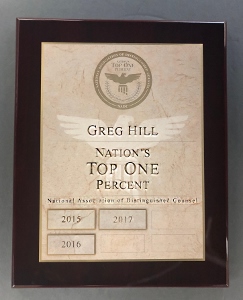The impression one gives in court to a judge, the jury, the bailiff, the courtroom staff and even the district attorney is never something to disregard. As one often never testifies at trial, what one wears and what one carries to court are usually scrutinized closely. One’s facial expressions and general demeanor are also important.
What to Take Away: It is a good idea to think about what one wears and carries to court by asking oneself, “If I were a judge or a juror, what would I think of someone wearing such clothes or holding such items? Would I think the person is a rebel who may break the law deliberately or is the person the type who looks conservative and would be careful to follow the law?”
Every lawyer has horror stories or comical anecdotes of the client who shows up for trial looking like he just got out of bed. One public defender I met told a story of a guy on trial for domestic violence who wore a t-shirt to court that said, “The bit&* made me do it!” When confronted about the apparent admission he wore, he explained, “I just put on the first shirt in my drawer. I did not even notice what I was wearing.”
 Riverside Superior Court
Riverside Superior Court
While it may seem obvious to some, there are certainly some “dos” and “don’ts” about what to wear to court. The best advice is to simply wear clean, conservative and professional-looking clothes. The clothes should fit. If one borrows a suit from someone who is thinner or much taller than the defendant, it suggests one does not care about what jurors think. If the clothes are normally ironed, iron them before one comes to court and, if a jacket, don’t drive to court wrinkling it in the process. Keep jewelry to a minimum and to only what is functional. It is fine to wear a wedding ring if one is married. One’s shoes should be shined, if they are the type that are shined.
The “don’ts” list is long, but merits mention. For women, do not wear neon colors, bold reds or all black. Tight fitting clothing is an absolute no-no. Costume jewelry is also a no-no, as are expensive rings. I tell clients to leave bracelets, buttons and lapel pins (except perhaps the U.S. flag) at home. Earrings should be small and not dangling. Makeup should be light and conservative. No false eyelashes. The purse one brings should be small and simple – nothing expensive and no designer purses.

For guys, I ask my male clients to leave cufflinks at home, as well as any rings beyond a wedding ring. No necklaces, chains or lapel pins except a small U.S. flag. While I am a Marine veteran, and I have immediate respect for any Marine, most jurors do not and attempting to waive one’s service in a judge or juror’s face is resented as asking for special treatment. Men should not wear grease in their hair, or if they absolutely must, it should be minimal.
Men should be clean shaven and comb their hair before showing up to court. If one normally has a shaved head, be sure it is freshly shaven. If one has any tattoos, I suggest covering them up as much as is possible. No nose-rings or pins.
Neither men nor women should wear dark or tinted glasses to court. The judge, the jury and the bailiff wants to see the client’s eyes.
What one carries is often scrutinized by jurors, the bailiff and the courtroom staff as well. A small notebook or day-planner is appropriate, but carrying the Wall Street Journal is not, as it gives the impression one is quite wealthy and needs to monitor his stock portfolio during trial. Some clients insist upon bringing a Bible to court, but I discourage this, as it may lead some jurors to sarcastically quip to others, “well, he certainly needs God now” or “maybe he’s trying to learn what he should have known earlier.”
When in court, respect for the judicial process, no matter how resentful one may feel or how unfair one believes it is, is probably the most important thing to show. Always address the judge with “Your honor” and never, ever interrupt the judge. It is also important to speak clearly and keep one’s answers short.
One should also do one’s best to keep all body language in check. Crossing one’s arms across one’s chest, as if one is angry, can show defiance of the judicial process. Slouching in one’s chair is similarly disrespectful and can suggest the verdict is unimportant to one, or that the defendant has given up, in admission of his crime.
Lastly, I ask that clients create eye contact with the judge and bailiff. It shows confidence and this can signal to jurors that one is innocent. I also ask that the client momentarily give eye contact with jurors, but nothing more than momentary.
For more information about being in court, click on the following articles:
- What Is the Difference Between a Misdemeanor an Infraction?
- What Is an Arraignment?
- What Is a Wobbler and Can a Felony Be Reduced to a Misdemeanor?
Contact Greg Hill & Associates
 Riverside Superior Court
Riverside Superior Court